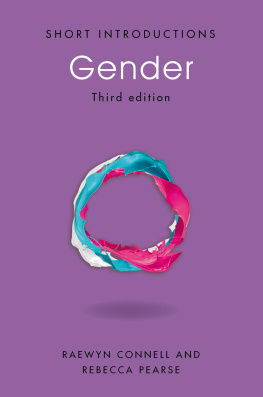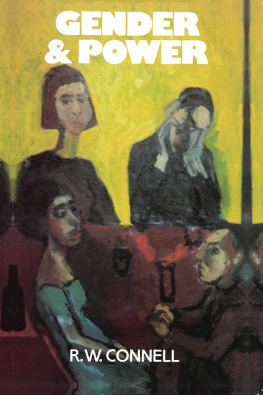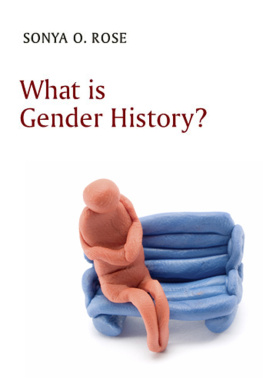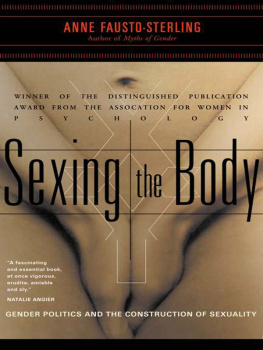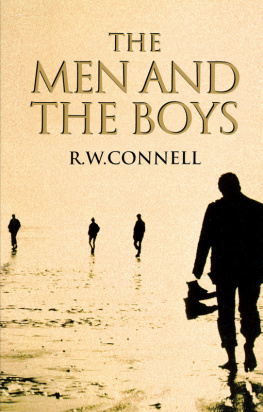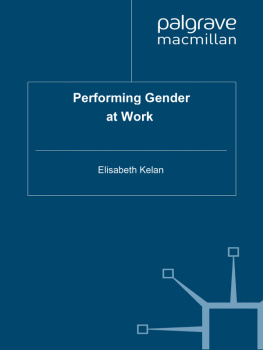
Table of Contents
SHORT INTRODUCTIONS
Nicholas Abercrombie, Sociology
Michael Bury, Health and Illness
Raewyn Connell & Rebecca Pearse, Gender 3rd edition
Hartley Dean, Social Policy 2nd edition
Lena Dominelli, Introducing Social Work
Jonathan Gray & Amanda D. Lotz, Television Studies
Jeffrey Haynes, Development Studies
Stuart Henry, Social Deviance
Stephanie Lawson, International Relations 2nd edition
Chris Rojek, Cultural Studies
Copyright Raewyn Connell & Rebecca Pearse 2015
The right of Raewyn Connell & Rebecca Pearse to be identified as Authors of this Work has been asserted in accordance with the UK Copyright, Designs and Patents Act 1988.
First edition first published in 2002 by Polity Press
Second edition first published in 2009 by Polity Press
This third edition first published in 2015 by Polity Press
Polity Press
65 Bridge Street
Cambridge CB2 1UR, UK
Polity Press
350 Main Street
Malden, MA 02148, USA
All rights reserved. Except for the quotation of short passages for the purpose of criticism and review, no part of this publication may be reproduced, stored in a retrieval system, or transmitted, in any form or by any means, electronic, mechanical, photocopying, recording or otherwise, without the prior permission of the publisher.
ISBN-13: 978-0-7456-8071-2
ISBN-13: 978-0-7456-8072-9 (pb)
ISBN-13: 978-0-7456-8732-2 (epub)
ISBN-13: 978-0-7456-8731-5 (mobi)
A catalogue record for this book is available from the British Library.
The publisher has used its best endeavours to ensure that the URLs for external websites referred to in this book are correct and active at the time of going to press. However, the publisher has no responsibility for the websites and can make no guarantee that a site will remain live or that the content is or will remain appropriate.
Every effort has been made to trace all copyright holders, but if any have been inadvertently overlooked the publisher will be pleased to include any necessary credits in any subsequent reprint or edition.
For further information on Polity, visit our website: politybooks.com
In memory of Pam Benton 19421997
She, who had Here so much essentiall joy
As no chance could distract, much lesse destroy;
she to Heaven is gone,
Who made this world in some proportion
A heaven, and here, became unto us all,
Joy, (as our joyes admit) essentiall.
Preface
Gender is a key dimension of personal life, social relations and culture. It is an arena in which we face hard practical issues about justice, identity and even survival.
Gender is also a topic on which there is a great deal of prejudice, myth and outright falsehood. Research and theory in the human sciences provide vital tools for understanding the real issues. This book tries to present an accessible, research-based, globally informed and theoretically coherent account of gender.
For people new to the study of gender, we introduce key examples of gender research, describe the main findings on important topics, and provide a map of debates and ideas. For people already familiar with gender issues, we propose an integrated approach that links issues ranging from the body and personality difference to the global economy and world peace. The book draws on a spectrum of the human sciences, from psychology and sociology to political science, cultural studies, education and history.
Modern research on gender was triggered by the women's movement for gender equality. There is a simple reason for this: most gender orders, around the world, privilege men and disadvantage women. Yet the details are not simple. There are different forms of privilege and disadvantage, and the scale of gender inequality varies from place to place. The costs of privilege may be high. Even the definition of who is a man and a woman can be contested.
Gender issues are about men quite as much as they are about women. There is now extensive research about masculinities, fatherhood, men's movements, men's violence, boys' education, men's health and men's involvement in achieving gender equality. We have woven this knowledge into the picture of gender.
We have also emphasized a world perspective. The view from the global North is important, but most people live in other places and have a different social experience. Therefore we give considerable attention to gender research and theory in countries outside the global metropole, places as diverse as Latvia, Chile, Australia, western and southern Africa, Indonesia and Japan.
The world faces urgent issues about gender. Indeed, a whole new realm of gender politics is emerging, with sharp questions about human rights, global economic injustice, environmental change, relations between generations, violence, both military and personal, and the conditions for living well.
If emerging gender orders are to be just, peaceful and humane which is by no means guaranteed we need well-founded knowledge and a sophisticated understanding of gender issues. To produce this understanding means sharing knowledge around the globe. Previous editions of this book have been translated into Chinese, Italian, Greek, Japanese, German and Polish. We hope this new edition will be as useful.
This edition includes a wholly new chapter on gender and environment, brings all chapters up to date with current research, includes a new case study, revises the treatment of gender theory, and tries to make the presentation throughout as clear and concise as possible.
A book that attempts to synthesize knowledge across a broad field of study rests on the labour of many people researchers, theorists, social movement activists, and the many people who participate in research studies.
Most of our intellectual debts are acknowledged in the text. Rebecca owes particular thanks to: James Hitchcock, Bronislava Lee, Stuart Rosewarne and Tim Hitchcock. Raewyn owes particular thanks to: Kylie Benton-Connell, Christabel Draffin, John Fisher, Patricia Selkirk, Carol Hagemann-White, Robert Morrell, Ulla Mller, Taga Futoshi, Teresa Valds, Toni Schofield, Lin Walker and Kirsten Gomard.
The book is dedicated to the memory of Pam Benton. The epigraph at the start of the book is from Pam's favourite poet, John Donne, and can be found in the poem The Second Anniversary.
Raewyn Connell and Rebecca Pearse
Sydney, December 2013
The question of gender
Noticing gender
One night a year, the attention of the TV-watching world is focused on Hollywood's most spectacular event, the Oscar awards ceremony. Famous people are driven up in limousines in front of an enthusiastic crowd, and in a blizzard of camera flashes they walk into the auditorium the men in tuxedos striding easily, the women going cautiously because they are wearing low-cut gowns and high-heeled shoes. As the evening wears on, awards are given out for film scores, camera work, script writing, direction, best foreign film, and so on. But in the categories that concern the people you see on screen when you go to the movies, there are two awards given: best actor and best actress; best supporting actor and best supporting actress.
The internet is saturated with images of glamorous people, from models in advertisements to all kind of celebrities and public figures. When pop star Mylie Cyrus performed at the MTV Music Video Awards (VMA) in 2013, the images of her sexually provocative dancing travelled at incredible speed across the world. After the event, Cyrus tweeted, Smilers! My VMA performance had 306.000 tweets per minute. That's more than the blackout or Superbowl! [

